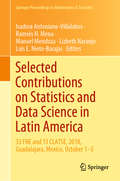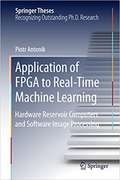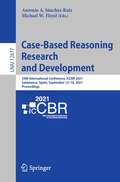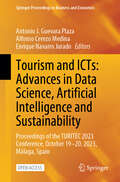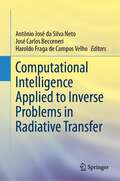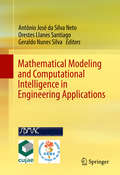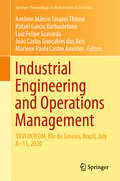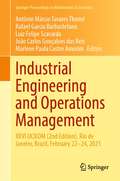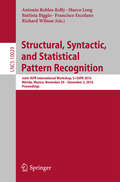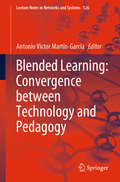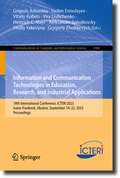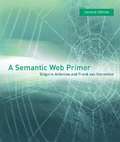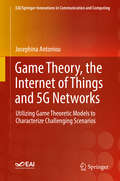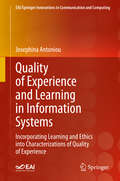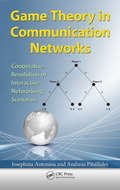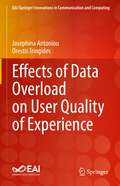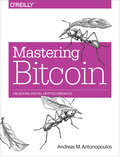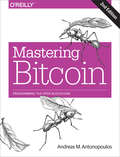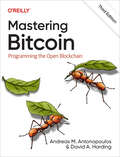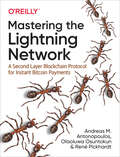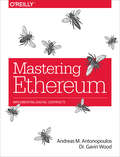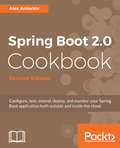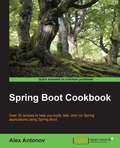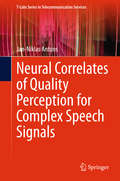- Table View
- List View
Selected Contributions on Statistics and Data Science in Latin America: 33 FNE and 13 CLATSE, 2018, Guadalajara, Mexico, October 1−5 (Springer Proceedings in Mathematics & Statistics #301)
by Isadora Antoniano-Villalobos Ramsés H. Mena Manuel Mendoza Lizbeth Naranjo Luis E. Nieto-BarajasThe volume includes a collection of peer-reviewed contributions from among those presented at the main conference organized yearly by the Mexican Statistical Association (AME) and every two years by a Latin-American Confederation of Statistical Societies. For the 2018 edition, particular attention was placed on the analysis of highly complex or large data sets, which have come to be known as “big data”. Statistical research in Latin America is prolific and research networks span within and outside the region. The goal of this volume is to provide access to selected works from Latin-American collaborators and their research networks to a wider audience. New methodological advances, motivated in part by the challenges of a data-driven world and the Latin American context, will be of interest to academics and practitioners around the world.
Application of FPGA to Real‐Time Machine Learning: Hardware Reservoir Computers And Software Image Processing (Springer Theses)
by Piotr AntonikNominated as an outstanding Ph.D. thesis by the Université libre de Bruxelles, Belgium.<p><p> Provides a thorough introduction to reservoir computing and field-programmable gate arrays Discusses the problems encountered on the path to the results discussed Uses an engaging and lively writing style.<p> This book lies at the interface of machine learning – a subfield of computer science that develops algorithms for challenging tasks such as shape or image recognition, where traditional algorithms fail – and photonics – the physical science of light, which underlies many of the optical communications technologies used in our information society. It provides a thorough introduction to reservoir computing and field-programmable gate arrays (FPGAs).<p> Recently, photonic implementations of reservoir computing (a machine learning algorithm based on artificial neural networks) have made a breakthrough in optical computing possible. In this book, the author pushes the performance of these systems significantly beyond what was achieved before. By interfacing a photonic reservoir computer with a high-speed electronic device (an FPGA), the author successfully interacts with the reservoir computer in real time, allowing him to considerably expand its capabilities and range of possible applications. Furthermore, the author draws on his expertise in machine learning and FPGA programming to make progress on a very different problem, namely the real-time image analysis of optical coherence tomography for atherosclerotic arteries.
Case-Based Reasoning Research and Development: 29th International Conference, ICCBR 2021, Salamanca, Spain, September 13–16, 2021, Proceedings (Lecture Notes in Computer Science #12877)
by Antonio A. Sánchez-Ruiz Michael W. FloydThis book constitutes the proceedings of the 29th International Conference on Case-Based Reasoning, ICCBR 2021, which took place in Salamanca, Spain, during September 13-16, 2021. The 21 papers presented in this volume were carefully reviewed and selected from 85 submissions. They deal with AI and related research focusing on comparison and integration of CBR with other AI methods such as deep learning architectures, reinforcement learning, lifelong learning, and eXplainable AI (XAI).
Tourism and ICTs: Proceedings of the TURITEC 2023 Conference, October 19–20, 2023, Málaga, Spain (Springer Proceedings in Business and Economics)
by Antonio J. Guevara Plaza Alfonso Cerezo Medina Enrique Navarro JuradoThis open-access book presents the best research papers from the XIV International Congress on Tourism and Information and Communications Technologies (TURITEC2023), held in Málaga, Spain from 19 to 20 October 2023. The book explores the profound impact of COVID-19 on the tourism industry and the increasing importance of digitalization and Information and Communication Technologies (ICTs) as key drivers for the industry's recovery, alongside sustainability. This curated collection of research papers offers conceptualizations, methodologies, analyses, and empirical case studies that illuminate the path to a resilient and sustainable future for tourism.
Computational Intelligence Applied to Inverse Problems in Radiative Transfer
by Antônio José da Silva Neto José Carlos Becceneri Haroldo Fraga de Campos VelhoThis book offers a careful selection of studies in optimization techniques based on artificial intelligence, applied to inverse problems in radiative transfer. In this book, the reader will find an in-depth exploration of heuristic optimization methods, each meticulously described and accompanied by historical context and natural process analogies.From simulated annealing and genetic algorithms to artificial neural networks, ant colony optimization, and particle swarms, this volume presents a wide range of heuristic methods. Additional approaches such as generalized extreme optimization, particle collision, differential evolution, Luus-Jaakola, and firefly algorithms are also discussed, providing a rich repertoire of tools for tackling challenging problems.While the applications showcased primarily focus on radiative transfer, their potential extends to various domains, particularly nonlinear and large-scale problems where traditional deterministic methods fall short. With clear and comprehensive presentations, this book empowers readers to adapt each method to their specific needs. Furthermore, practical examples of classical optimization problems and application suggestions are included to enhance your understanding.This book is suitable to any researcher or practitioner whose interests lie on optimization techniques based in artificial intelligence and bio-inspired algorithms, in fields like Applied Mathematics, Engineering, Computing, and cross-disciplinary areas.
Mathematical Modeling and Computational Intelligence in Engineering Applications
by Antônio José da Silva Neto Orestes Llanes Santiago Geraldo Nunes SilvaThis book brings together a rich selection of studies in mathematical modeling and computational intelligence, with application in several fields of engineering, like automation, biomedical, chemical, civil, electrical, electronic, geophysical and mechanical engineering, on a multidisciplinary approach. Authors from five countries and 16 different research centers contribute with their expertise in both the fundamentals and real problems applications based upon their strong background on modeling and computational intelligence. The reader will find a wide variety of applications, mathematical and computational tools and original results, all presented with rigorous mathematical procedures. This work is intended for use in graduate courses of engineering, applied mathematics and applied computation where tools as mathematical and computational modeling, numerical methods and computational intelligence are applied to the solution of real problems.
Crossy Road Guía de Juego
by António José Leite da Silva Correia Hiddenstuff EntertainmentComrpando este guia de jogo avançado e detalhado, eis o que irás obter: - Dicas profissionais e estratégias. - Cheats e Hacks. - Segredos, dicas, cheats, desbloqueadores e truques usados pelos jogadores Pro! - Como obter dinheiro e moedas em abundância. - E MUITO MAIS! Todas as versões deste guia têm imagens que te ajudam a compreender melhor o jogo. Não há um guia tão compreensivo e avançado como este. Estarás satisfeito com este guia e irás beneficiar muito mais quando comparado com outros guias que andam por aí. Compra agora e derrota os teus adversários. Torna-te hoje um jogador Pro!
Industrial Engineering and Operations Management: XXVI IJCIEOM, Rio de Janeiro, Brazil, July 8–11, 2020 (Springer Proceedings in Mathematics & Statistics #337)
by Antônio Márcio Tavares Thomé Rafael Garcia Barbastefano Luiz Felipe Scavarda João Carlos Gonçalves dos Reis Marlene Paula Castro AmorimThis volume gathers selected peer-reviewed papers presented at the XXVI International Joint Conference on Industrial Engineering and Operations Management (IJCIEOM), held on July 8-11, 2020 in Rio de Janeiro, Brazil. The respective chapters address a range of timely topics in industrial engineering, including operations and process management, global operations, managerial economics, data science and stochastic optimization, logistics and supply chain management, quality management, product development, strategy and organizational engineering, knowledge and information management, work and human factors, sustainability, production engineering education, healthcare operations management, disaster management, and more. These topics broadly involve fields like operations, manufacturing, industrial and production engineering, and management. Given its scope, the book offers a valuable resource for those engaged in optimization research, operations research, and practitioners alike.
Industrial Engineering and Operations Management: XXVI IJCIEOM (2nd Edition), Rio de Janeiro, Brazil, February 22–24, 2021 (Springer Proceedings in Mathematics & Statistics #367)
by Antônio Márcio Tavares Thomé Rafael Garcia Barbastefano Luiz Felipe Scavarda João Carlos Gonçalves dos Reis Marlene Paula Castro AmorimThis proceedings volume gathers together selected peer-reviewed papers presented at the second edition of the XXVI International Joint Conference on Industrial Engineering and Operations Management (IJCIEOM), which was virtually held on February 22-24, 2021 with the main organization based at the Pontifical Catholic University of Rio de Janeiro, Brazil. Works cover a range of topics in industrial engineering, including operations and process management, global operations, managerial economics, data science and stochastic optimization, logistics and supply chain management, quality management, product development, strategy and organizational engineering, knowledge and information management, sustainability, and disaster management, to name a few. These topics broadly involve fields like operations, manufacturing, industrial and production engineering, and management. This book can be a valuable resource for researchers and practitioners in optimization research, operations research, and correlated fields.
Structural, Syntactic, and Statistical Pattern Recognition: Joint IAPR International Workshop, S+SSPR 2016, Mérida, Mexico, November 29 - December 2, 2016, Proceedings (Lecture Notes in Computer Science #10029)
by Antonio Robles-Kelly, Marco Loog, Battista Biggio, Francisco Escolano and Richard WilsonThis book constitutes the proceedings of the Joint IAPR International Workshop on Structural Syntactic, and Statistical Pattern Recognition, S+SSPR 2016, consisting of the International Workshop on Structural and Syntactic Pattern Recognition SSPR, and the International Workshop on Statistical Techniques in Pattern Recognition, SPR. The 51 full papers presented were carefully reviewed and selected from 68 submissions. They are organized in the following topical sections: dimensionality reduction, manifold learning and embedding methods; dissimilarity representations; graph-theoretic methods; model selection, classification and clustering; semi and fully supervised learning methods; shape analysis; spatio-temporal pattern recognition; structural matching; text and document analysis.
Blended Learning: Convergence between Technology and Pedagogy (Lecture Notes in Networks and Systems #126)
by Antonio Víctor Martín-GarcíaThis book focuses on essential aspects of the theoretical foundations that support blended learning (BL) as a teaching training modality in tertiary education. Analyzing the changes in the world of education that lead to new ways of thinking and learning, it redefines the concept of blended learning at a time of constant growth in many universities around the world. This involves a shared reflection on the role of technology in the current university teacher education programs, as well as on the role that pedagogy plays in increasingly technology-driven contexts. Furthermore, the book presents pedagogical approaches to guide university professors in the design and implementation of blended learning courses. To this end, it describes some of the major models and approaches to BL instructional design, and examines issues related to the quality of BL training and the indicators to measure it, in order to identify those models that contribute to a better understanding of the dimensions that increase its effectiveness.
Information and Communication Technologies in Education, Research, and Industrial Applications: 18th International Conference, ICTERI 2023, Ivano-Frankivsk, Ukraine, September 18–22, 2023, Proceedings (Communications in Computer and Information Science #1980)
by Grigoris Antoniou Vadim Ermolayev Vitaliy Kobets Vira Liubchenko Heinrich C. Mayr Aleksander Spivakovsky Vitaliy Yakovyna Grygoriy ZholtkevychThis book constitutes the proceedings of the 18th International Conference, ICTERI 2023, held in Ivano-Frankivsk, Ukraine, during September 18–22, 2023.The 21 full papers included in this volume were carefully reviewed and selected from 90 submissions. The volume focuses on research advances in ICT, business or academic applications of ICT, and design and deployment of ICT infrastructures.
A Semantic Web Primer
by Grigoris Antoniou Frank Van HarmelenThe development of the Semantic Web, with machine-readable content, has the potential to revolutionize the World Wide Web and its use. A Semantic Web Primer provides an introduction and guide to this still emerging field, describing its key ideas, languages, and technologies. Suitable for use as a textbook or for self-study by professionals, it concentrates on undergraduate-level fundamental concepts and techniques that will enable readers to proceed with building applications on their own and includes exercises, project descriptions, and annotated references to relevant online materials. A Semantic Web Primer provides a systematic treatment of the different languages (XML, RDF, OWL, and rules) and technologies (explicit metadata, ontologies, and logic and inference) that are central to Semantic Web development as well as such crucial related topics as ontology engineering and application scenarios. This substantially revised and updated second edition reflects recent developments in the field, covering new application areas and tools. The new material includes a discussion of such topics as SPARQL as the RDF query language; OWL DLP and its interesting practical and theoretical properties; the SWRL language (in the chapter on rules); OWL-S (on which the discussion of Web services is now based). The new final chapter considers the state of the art of the field today, captures ongoing discussions, and outlines the most challenging issues facing the Semantic Web in the future. Supplementary materials, including slides, online versions of many of the code fragments in the book, and links to further reading, can be found at www.semanticwebprimer.org.
Game Theory, the Internet of Things and 5G Networks: Utilizing Game Theoretic Models to Characterize Challenging Scenarios (EAI/Springer Innovations in Communication and Computing)
by Josephina AntoniouThis book shows how to model selected communication scenarios using game theory. The book helps researchers specifically dealing with scenarios motivated by the increasing use of the Internet of Things (IoT) and 5G Communications by using game theory to approach the study of such challenging scenarios. The author explains how game theory acts as a mathematical tool that models decision making in terms of strategies and mechanisms that can result in optimal payoffs for a number of interacting entities, offering often antagonistic behaviors. The book explores new technologies in terms of design, development and management from a theoretical perspective, using game theory to analyze strategic situations and demonstrate profitable behaviors of the cooperative entities. The book identifies and explores several significant applications/uses/situations that arise from the vast deployment of the IoT. The presentation of the technological scenarios is followed in each of the first four chapters by a step-by-step theoretical model often followed by equilibrium proof, and numerical simulation results, that are explained in a tutorial-like manner. The four chapters tackle challenging IoT and 5G related issues, including: new security threats that IoT brings, e.g. botnets, ad hoc vehicular networks and the need for trust in vehicular communications, content repetition by offloading traffic onto mobile users, as well as issues due to new wearable devices that enable data collection to become more intrusive.
Quality of Experience and Learning in Information Systems: Incorporating Learning and Ethics into Characterizations of Quality of Experience (EAI/Springer Innovations in Communication and Computing)
by Josephina AntoniouThe book shows how researchers, practitioners, and designers can improve user experiences with technology by understanding various user learning styles and characteristics when they interact with new and challenging applications and interfaces. Quality of experience in this new technological environment is affected by the learning curve involved in being able to use the new interfaces in a satisfactory way. The author explores the variations in quality of experience when considering learning and ethics when interacting with new, emerging technologies. The author shows how results can be applied to technologies such as big data, AI, 5G, and Internet of Things (IoT). Taken into account are also safety and security requirements, context, environment, etc. The book explores the idea of learning, ethics, and the idea that there exists a “recipe” for a satisfactory interaction with technology if such relevant parameters are taken into consideration.Analyzes user habits to improve quality of experience when interacting with technology;Shows how to apply quality of service techniques to 5G, IoT, big data and AI;Uses behavior models to analyze interactions to improve the user quality of experience.
Game Theory in Communication Networks: Cooperative Resolution of Interactive Networking Scenarios
by Josephina Antoniou Andreas PitsillidesFocusing on heterogeneous networks, this book addresses important resource management and security issues found in networks and uses theoretical tools to model them. Although it explores network design and management from the perspective of game theory and graph theory, the text also provides practical solutions for each mechanism that needs improvement with a step-by-step approach. It also includes simulation code, so readers can use some or all of the proposed models for better network planning.
Effects of Data Overload on User Quality of Experience (EAI/Springer Innovations in Communication and Computing)
by Josephina Antoniou Orestis TringidesThis book introduces a unique perspective on the use of data from popular emerging technologies and the effect on user quality of experience (QoE). The term data is first refined into specific types of data such as financial data, personal data, public data, context data, generated data, and the popular big data. The book focuses the responsible use of data, with consideration to ethics and wellbeing, in each setting. The specific nuances of different technologies bring forth interesting case studies, which the book breaks down into mathematical models so they can be analyzed and used as powerful tools. Overall, this perspective on the use of data from popular emerging technologies and the resulting QoE analysis will greatly benefit researchers, educators and students in fields related to ICT studies, especially where there is additional interest in ethics and wellbeing, user experience, data management, and their link to emerging technologies.
Mastering Bitcoin
by Andreas M. AntonopoulosWant to join the technological revolution that's taking the world of finance by storm? Mastering Bitcoin is your guide through the seemingly complex world of bitcoin, providing the requisite knowledge to help you participate in the internet of money. Whether you're building the next killer app, investing in a startup, or simply curious about the technology, this practical book is essential reading.Bitcoin, the first successful decentralized digital currency, is still in its infancy and it's already spawned a multi-billion dollar global economy. This economy is open to anyone with the knowledge and passion to participate. Mastering Bitcoin provides you with the knowledge you need (passion not included).This book includes:A broad introduction to bitcoin--ideal for non-technical users, investors, and business executivesAn explanation of the technical foundations of bitcoin and cryptographic currencies for developers, engineers, and software and systems architectsDetails of the bitcoin decentralized network, peer-to-peer architecture, transaction lifecycle, and security principlesOffshoots of the bitcoin and blockchain inventions, including alternative chains, currencies, and applicationsUser stories, analogies, examples, and code snippets illustrating key technical concepts
Mastering Bitcoin: Programming the Open Blockchain
by Andreas M. AntonopoulosJoin the technological revolution that’s taking the financial world by storm. Mastering Bitcoin is your guide through the seemingly complex world of bitcoin, providing the knowledge you need to participate in the internet of money. Whether you’re building the next killer app, investing in a startup, or simply curious about the technology, this revised and expanded second edition provides essential detail to get you started.Bitcoin, the first successful decentralized digital currency, is still in its early stages and yet it’s already spawned a multi-billion-dollar global economy open to anyone with the knowledge and passion to participate. Mastering Bitcoin provides the knowledge. You simply supply the passion.The second edition includes:A broad introduction of bitcoin and its underlying blockchain—ideal for non-technical users, investors, and business executivesAn explanation of the technical foundations of bitcoin and cryptographic currencies for developers, engineers, and software and systems architectsDetails of the bitcoin decentralized network, peer-to-peer architecture, transaction lifecycle, and security principlesNew developments such as Segregated Witness, Payment Channels, and Lightning NetworkA deep dive into blockchain applications, including how to combine the building blocks offered by this platform into higher-level applicationsUser stories, analogies, examples, and code snippets illustrating key technical concepts
Mastering Bitcoin
by Andreas M. Antonopoulos David A. HardingJoin the technological revolution that's taking the financial world by storm. Mastering Bitcoin is your guide through the seemingly complex world of Bitcoin, providing the knowledge you need to participate in the internet of money. Whether you're building the next killer app, investing in a startup, or simply curious about the technology, this revised and expanded third edition provides essential detail to get you started. Bitcoin, the first successful decentralized digital currency, has already spawned a multibillion-dollar global economy open to anyone with the knowledge and passion to participate. Mastering Bitcoin provides the knowledge. You supply the passion.The third edition includes:A broad introduction to Bitcoin and its underlying blockchain—ideal for nontechnical users, investors, and business executivesAn explanation of Bitcoin's technical foundation and cryptographic currency for developers, engineers, and software and systems architectsDetails of the Bitcoin decentralized network, peer-to-peer architecture, transaction lifecycle, and security principlesNew developments such as Taproot, Tapscript, Schnorr signatures, and the Lightning NetworkA deep dive into Bitcoin applications, including how to combine the building blocks offered by this platform into powerful new toolsUser stories, analogies, examples, and code snippets illustrating key technical concepts
Mastering the Lightning Network
by Andreas M. Antonopoulos Olaoluwa Osuntokun René PickhardtThe Lightning Network (LN) is a rapidly growing second-layer payment protocol that works on top of Bitcoin to provide near-instantaneous transactions between two parties. With this practical guide, authors Andreas M. Antonopoulos, Olaoluwa Osuntokun, and Rene Pickhardt explain how this advancement will enable the next level of scale for Bitcoin, increasing speed and privacy while reducing fees.Ideal for developers, systems architects, investors, and entrepreneurs looking to gain a better understanding of LN, this book demonstrates why experts consider LN a critical solution to Bitcoin's scalability problem. You'll learn how LN has the potential to support far more transactions than today's financial networks.This book examines:How the Lightning Network addresses the challenge of blockchain scalingThe Basis of Lightning Technology (BOLT) standards documentsThe five layers of the Lightning Network Protocol SuiteLN basics, including wallets, nodes, and how to operate oneLightning payment channels, onion routing, and gossip protocolFinding paths across payment channels to transport Bitcoin off-chain from sender to recipient
Mastering Ethereum: Building Smart Contracts and DApps
by Andreas M. Antonopoulos Gavin WoodEthereum represents the gateway to a worldwide, decentralized computing paradigm. This platform enables you to run decentralized applications (DApps) and smart contracts that have no central points of failure or control, integrate with a payment network, and operate on an open blockchain. With this practical guide, Andreas M. Antonopoulos and Gavin Wood provide everything you need to know about building smart contracts and DApps on Ethereum and other virtual-machine blockchains.Discover why IBM, Microsoft, NASDAQ, and hundreds of other organizations are experimenting with Ethereum. This essential guide shows you how to develop the skills necessary to be an innovator in this growing and exciting new industry.Run an Ethereum client, create and transmit basic transactions, and program smart contractsLearn the essentials of public key cryptography, hashes, and digital signaturesUnderstand how "wallets" hold digital keys that control funds and smart contractsInteract with Ethereum clients programmatically using JavaScript libraries and Remote Procedure Call interfacesLearn security best practices, design patterns, and anti-patterns with real-world examplesCreate tokens that represent assets, shares, votes, or access control rightsBuild decentralized applications using multiple peer-to-peer (P2P) components
Spring Boot 2.0 Cookbook Second Edition: Configure, test, extend, deploy, and monitor your Spring Boot application both outside and inside the cloud, 2nd Edition
by Alex AntonovTake your application development skills to the next level by implementing Spring Boot features effectively Key Features This collection of effective recipes serves as guidelines for Spring Boot application development Get up to date with features of the latest version of Spring Boot 2.0 Tips and tricks to improve your efficiency through the stages of software development Book Description The Spring framework provides great flexibility for Java development, which also results in tedious configuration work. Spring Boot addresses the configuration difficulties of Spring and makes it easy to create standalone, production-grade Spring-based applications. This practical guide makes the existing development process more efficient. Spring Boot Cookbook 2.0 Second Edition smartly combines all the skills and expertise to efficiently develop, test, deploy, and monitor applications using Spring Boot on premise and in the cloud. We start with an overview of the important Spring Boot features you will learn to create a web application for a RESTful service. Learn to fine-tune the behavior of a web application by learning about custom routes and asset paths and how to modify routing patterns. Address the requirements of a complex enterprise application and cover the creation of custom Spring Boot starters. This book also includes examples of the new and improved facilities available to create various kinds of tests introduced in Spring Boot 1.4 and 2.0, and gain insights into Spring Boot DevTools. Explore the basics of Spring Boot Cloud modules and various Cloud starters to make applications in “Cloud Native” and take advantage of Service Discovery and Circuit Breakers. What you will learn Get to know Spring Boot Starters and create custom auto-configurations Work with custom annotations that enable bean activation Use DevTools to easily develop and debug applications Learn the effective testing techniques by integrating Cucumber and Spock Observe an eternal application configuration using Consul Move your existing Spring Boot applications to the cloud Use Hashicorp Consul and Netflix Eureka for dynamic Service Discovery Understand the various mechanisms that Spring Boot provides to examine an application’s health Who this book is for This book is for Java Developers who have good knowledge and understanding of Spring and Java application development.
Spring Boot Cookbook
by Alex AntonovOver 35 recipes to help you build, test, and run Spring applications using Spring Boot About This Book * Learn to create different types of Spring Boot applications, configure behavior, and add custom components * Become more efficient in testing, deploying, and monitoring Spring Boot based applications * This is a practical guide that will help Spring developers to develop and deploy applications using Spring Boot Who This Book Is For If you are a Spring Developer who has good knowledge level and understanding of Spring Boot and application development and now want to learn efficient Spring Boot development techniques in order to make the existing development process more efficient, then this book is for you. What You Will Learn * Create Spring Boot applications from scratch * Configure and tune web applications and containers * Create custom Spring Boot auto-configurations and starters * Use Spring Boot Test framework with JUnit, Cucumber, and Spock * Configure and tune web applications and containers * Deploy Spring Boot as self-starting executables and Docker containers * Monitor data using DropWizard, Graphite, and Dashing In Detail Spring Boot is Spring's convention-over-configuration solution. This feature makes it easy to create Spring applications and services with absolute minimum fuss. Spring Boot has the great ability to be customized and enhanced, and is specifically designed to simplify development of a new Spring application. This book will provide many detailed insights about the inner workings of Spring Boot, as well as tips and recipes to integrate the third-party frameworks and components needed to build complex enterprise-scale applications. The book starts with an overview of the important and useful Spring Boot starters that are included in the framework, and teaches you to create and add custom Servlet Filters, Interceptors, Converters, Formatters, and PropertyEditors to a Spring Boot web application. Next it will cover configuring custom routing rules and patterns, adding additional static asset paths, and adding and modifying servlet container connectors and other properties such as enabling SSL. Moving on, the book will teach you how to create custom Spring Boot Starters, and explore different techniques to test Spring Boot applications. Next, the book will show you examples of configuring your build to produce Docker images and self-executing binary files for Linux/OSX environments. Finally, the book will teach you how to create custom health indicators, and access monitoring data via HTTP and JMX. Style and approach This book is a cohesive collection of recipes that provide developers with a set of connected guidelines on how to build, configure, and customize their application, starting from the design and development stages, all the way through testing, deployment, and production monitoring.
Neural Correlates of Quality Perception for Complex Speech Signals
by Jan-Niklas AntonsThis book interconnects two essential disciplines to study the perception of speech: Neuroscience and Quality of Experience, which to date have rarely been used together for the purposes of research on speech quality perception. In five key experiments, the book demonstrates the application of standard clinical methods in neurophysiology on the one hand and of methods used in fields of research concerned with speech quality perception on the other. Using this combination, the book shows that speech stimuli with different lengths and different quality impairments are accompanied by physiological reactions related to quality variations, e. g. , a positive peak in an event-related potential. Furthermore, it demonstrates that - in most cases - quality impairment intensity has an impact on the intensity of physiological reactions.
